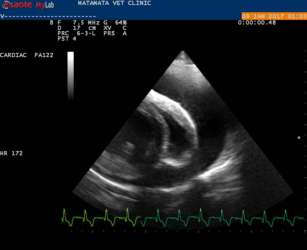April 12, 2018
Similar to us our pets can suffer from congenital heart diseases, which can lead to illness and a shorter life span.
There are many different types of heart disease related to the different parts of the heart that are affected. Each different disease has a different effect on the animal and therefore causes different clinical signs. Some severe heart disease leads to a shorter life with some animals not making it past the first few months.
The basic procedure of heart screening involves the monitoring and examination of the heart by electrocardiogram and echocardiogram (ultrasound), in the search for irregularities that might demonstrate the presence of hereditary abnormalities. All cardiac testing is performed in a conscious pet.
Examples of cardiac/heart diseases include:
- Sub Aortic stenosis (e.g. Boxers, Golden Retrievers, Newfoundlands),
- Pulmonic stenosis (Bulldogs)
- Mitral valve diseases (e.g. Cavalier King Charles Spaniels, Chihuahuas, Bull Terriers)
- Boxer Cardiomyopathy
- Dilated Cardiomyopathy (Dobermanns, Cocker Spaniels)
- Hypertrophic Cardiomyopathy in cats (e.g. Maine Coons, Ragdolls).
A cardiac certificate is required from a veterinarian, annually for any animal in a breeding programme. This involves an auscultation (listening) to the chest with a stethoscope by a veterinarian. If any irregularities are found, then an ultrasound will be recommended.
Testing Requirements:
- Can be performed in a conscious pet at any age
- The animal must have a microchip
- All registration paperwork must be presented if a registered pedigree
- Is repeated annually while the dog is in a breeding programme
- A cardiac certificate is an examination that can be undertaken in a short consultation, or prior to other health testing
- If an ECG and an echocardiogram are needed then an hour consultation is needed, and hair will need to be clipped to allow visualisation.
For bookings or further questions please don’t hesitate to contact us on 07 888 8197





